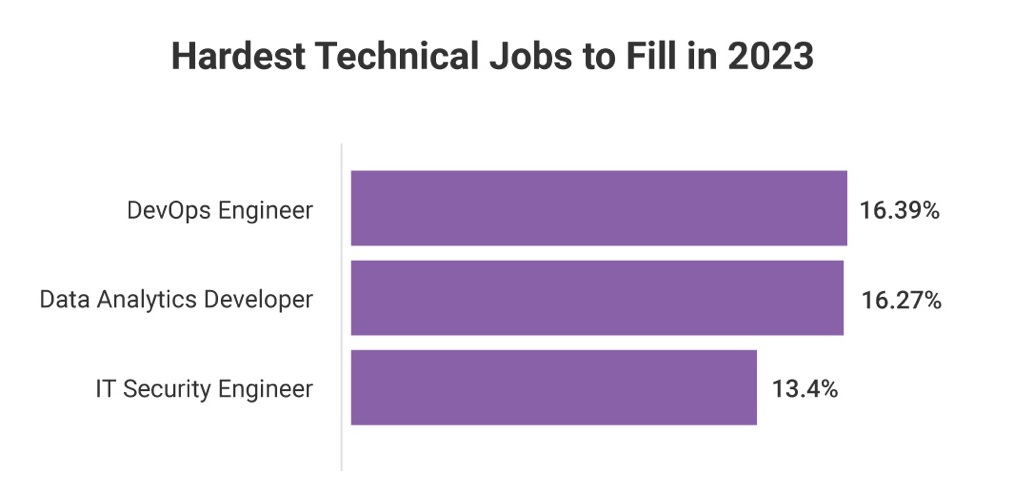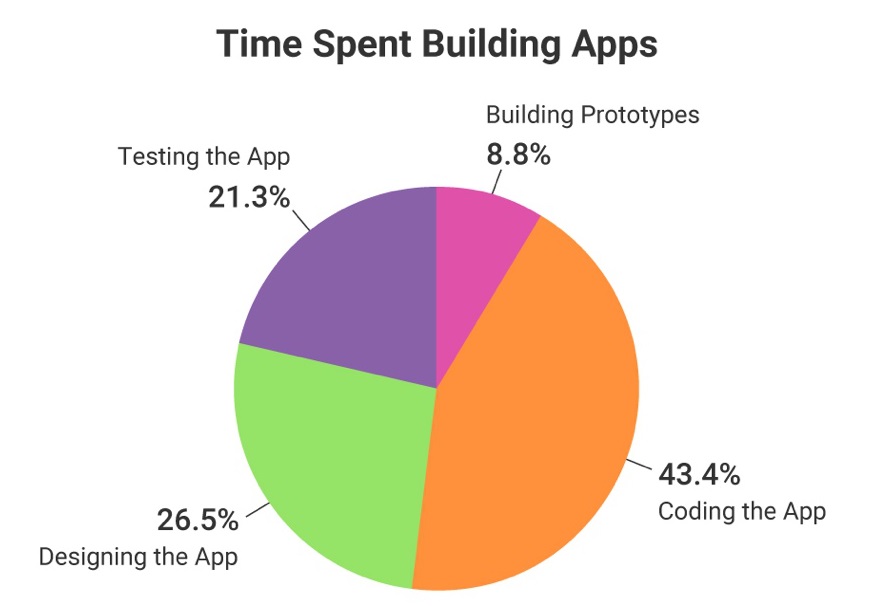Check Point® Software Technologies Ltd.(link is external) announced that U.S. News & World Report has named the company among its 2025-2026 list of Best Companies to Work For(link is external).
Reveal's Software Development Challenges 2023 survey revealed that developer shortage remains a key challenge for the second year in a row.
According to one-third of the respondents (37.5%), the industry will continue to need help finding skilled developers in 2023.
The demand for tech talent just can't meet the supply of trained developers. The US Labor Department reports that software developers are among the top four most in-demand professions over the next 10 years. This demand has many implications for the software development industry, such as difficulty competing and innovating, higher costs, and lost revenue.
The survey also identified the top three technical jobs that will be hardest to fill in 2023. Engineers with DevOps skills (16.39%) are the most in demand, closely followed by Data Analytics Developers (16.27%), and IT Security Engineers (13.4%).

In today's tight job market, where demand for experienced employees outstrips supply, organizations must turn to new solutions that can address insufficient skills, solve problems and save money. The survey also found a growing need for innovations that can help meet the demand for building applications faster and with fewer resources.
The challenge of finding and recruiting the right tech talent is being solved by the use of low-code/no-code tools in three-quarters (76.8%) of organizations. Low-code/no-code tools are helping alleviate the demand for skilled developers by reducing the need for heavy hand-coding. This approach reduces the need for developers in areas such as UX flows, screen design, theming, and branding and can eliminate the need for manual HTML & CSS tweaking.

Key Software Development Challenges
The survey found that the most significant software development challenges in 2023 will be:
■ Inability to keep pace with innovation in developer tools (27.7%)
■ Difficulties with third-party integrations (26.7%)
■ Workload management (26.2%)
■ Security threats (26.1%)
■ Project management (26.1%)
■ Steep client expectations (26%)
Many of these challenges can be overcome with a digital workplace productivity tool.
Three years after the pandemic's start, the remote way of working has already become the new normal way of working. Digital workplace productivity tools are an integral part of this transformation as they provide distributed teams with the tools to complete their work efficiently. These platforms, which integrate project and content management, chat, and even data analytics in one software, increase work productivity, communication, and results.
To address these challenges, business teams are planning to better utilize their resources in 2023 by:
■ Improving project management (30%)
■ Improving designer/developer collaboration (30%)
■ Using software that will work for citizen developers (27%)
■ Utilizing remote staff (25%)
■ Incorporating data catalog/analytics catalog (25%)
The Need of Embedded Analytics
The benefits of embedded analytics are no longer a secret. Data rules the business world today, so businesses that delay incorporating analytics tools can lose their competitive edge.
The survey found that 48% of developers embedded analytics into clients' apps in 2022, compared to 30.8% in 2021, and 74.9% of software developers expect their organization's focus on business intelligence to increase in 2023.
Developers identified the top four reasons to embed analytics:
■ To improve productivity
■ To increase sales/revenue
■ To understand business problems
■ To make better business decisions
Expansion Plans
The plans for growth in 2023 include adopting new technologies and applications (such as low-code/no-code tools, embedded analytics solutions, and/or a digital workplace platform) into the software developer's workflow.
35% of respondents also plan to expand into new markets, and 32.5% are planning on taking on new projects. Requests for proposals are also expected to rise in 2023.
Methodology: Over 2,000 software developers and IT professionals participated in the Infragistics' Reveal survey from December 2022 to January 2023.
Industry News
Postman announced new capabilities that make it dramatically easier to design, test, deploy, and monitor AI agents and the APIs they rely on.
Opsera announced the expansion of its partnership with Databricks.
Postman announced Agent Mode, an AI-native assistant that delivers real productivity gains across the entire API lifecycle.
Progress Software announced the Q2 2025 release of Progress® Telerik® and Progress® Kendo UI®, the .NET and JavaScript UI libraries for modern application development.
Voltage Park announced the launch of its managed Kubernetes service.
Cobalt announced a set of powerful product enhancements within the Cobalt Offensive Security Platform aimed at helping customers scale security testing with greater clarity, automation, and control.
LambdaTest announced its partnership with Assembla, a cloud-based platform for version control and project management.
Salt Security unveiled Salt Illuminate, a platform that redefines how organizations adopt API security.
Workday announced a new unified, AI developer toolset to bring the power of Workday Illuminate directly into the hands of customer and partner developers, enabling them to easily customize and connect AI apps and agents on the Workday platform.
Pegasystems introduced Pega Agentic Process Fabric™, a service that orchestrates all AI agents and systems across an open agentic network for more reliable and accurate automation.
Fivetran announced that its Connector SDK now supports custom connectors for any data source.
Copado announced that Copado Robotic Testing is available in AWS Marketplace, a digital catalog with thousands of software listings from independent software vendors that make it easy to find, test, buy, and deploy software that runs on Amazon Web Services (AWS).
Check Point® Software Technologies Ltd.(link is external) announced major advancements to its family of Quantum Force Security Gateways(link is external).
Sauce Labs announced the general availability of iOS 18 testing on its Virtual Device Cloud (VDC).




